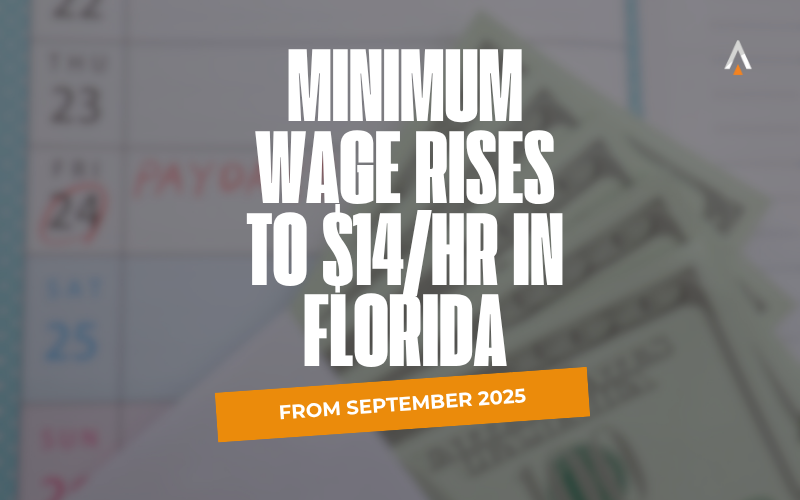Florida Minimum Wage 2025: Guide to Increase to $14/hour

Starting September 30, 2025, Florida's minimum wage will rise to $14/hour. Learn how this change affects you and its impact on the economy and real estate market.
Florida's economic landscape is about to undergo a significant change that will benefit millions of workers. Starting September 30, 2025, the minimum wage in Florida will increase to $14 per hour. This adjustment is not an isolated measure but part of a progressive plan approved by voters to improve residents' purchasing power. If you live, work, or invest in the Sunshine State, it is crucial to understand how this increase will impact not only your wallet but also the local economy and Miami's dynamic real estate market. In this comprehensive guide, we will break down everything you need to know about this important update.
From specific details for tipped workers to the legal context behind this decision and its effect on the cost of living, here you will find clear and precise answers. The goal is that, by the end of this read, you will have a comprehensive understanding of what this increase represents for Florida's economic future.
What Does the Florida Minimum Wage Increase 2025 Entail?
The wage increase is a direct result of Amendment 2, an initiative approved in the 2020 elections. This constitutional amendment established a schedule of annual increases with the ultimate goal of reaching $15 per hour by 2026. The step to be taken in 2025 is one of the most important on this roadmap.
Key Figures of the Increase
It is essential to be clear about the new figures that will come into force:
- General Wage: Increases from $13 to $14 per hour.
- Tipped Workers: The base wage for employees who receive tips (such as waiters and bartenders) will rise from $9.98 to $10.98 per hour. Employers can apply a tip credit of up to $3.02, provided that the sum of the base wage and tips reaches at least the general minimum wage of $14.
- Implementation Date: The change will be effective on September 30, 2025.
This adjustment places Florida well above the federal minimum wage, which has been stagnant at $7.25 per hour for over a decade. This difference underscores the state's commitment to offering compensation more aligned with the current cost of living, especially in vibrant and constantly growing cities like Miami.
Impact on Miami's Economy and Real Estate Market
An increase in the minimum wage impacts the entire economic structure. For workers, it means greater purchasing power, allowing them to better cope with the cost of living and stimulating local consumption. Businesses in sectors such as retail and hospitality could see an increase in sales as consumers have more disposable income.
The increase in residents' purchasing power not only boosts the local economy but also opens up new opportunities in the real estate sector. More families could qualify for rentals and mortgage loans.NegocioMiami Team
How Does It Affect Your Real Estate Investment?
For investors and property owners, this economic change is a positive sign. A stronger labor market with better wages translates into:
- Increased Rental Demand: With higher incomes, more people can afford to rent quality housing, which reduces vacancy rates and stabilizes rental income.
- Potential for New Buyers: The wage increase can be the boost many people need to meet the requirements for a mortgage loan and take the step toward buying their first home.
- Property Appreciation: A healthy and growing economic environment, like Miami's, tends to increase real estate values in the long term. This wage increase contributes to that strength.
If you are considering investing, now is an ideal time. The strengthening of Florida's economic base creates fertile ground for secure and profitable investments. Explore the properties available in the best areas of Miami and take advantage of this economic situation.
Frequently Asked Questions (FAQs)
1. When will I see the increase reflected in my pay?
The increase to $14 per hour is mandatory for all hours worked starting September 30, 2025. You should see the change reflected in the first pay cycle that includes that date.
2. Does this increase apply to all workers in Florida?
Yes, Florida's minimum wage law applies to the vast majority of employees in the state, in both the public and private sectors. There are very few exceptions, so it is advisable to consult the official page of the Florida Department of Economic Opportunity for specific cases.
3. What will happen to the minimum wage after 2026?
After reaching $15 per hour on September 30, 2026, the plan establishes that starting in 2027, the minimum wage will be adjusted annually based on inflation, using the Consumer Price Index (CPI). This will ensure that wages do not lose purchasing power over time.
4. How should business owners prepare for this change?
Employers should plan ahead by updating their payroll systems to reflect the new wage. It's a good opportunity to review budgets, optimize operational efficiency, and clearly communicate changes to staff to ensure a smooth transition and compliance with the law.
Conclusion: A Firm Step Towards Prosperity
The increase of the minimum wage in Florida to $14 per hour in 2025 is more than just a figure; it is a fundamental pillar for building a more equitable and robust economy. It directly benefits workers, strengthens the consumer market, and, as we have seen, creates a very favorable environment for the real estate sector.
At NegocioMiami, we understand that economic changes are opportunities. Whether you are looking to buy your dream home or make a smart investment, our team is ready to advise you. Florida's future is bright, and this is the perfect time to be part of its growth.
